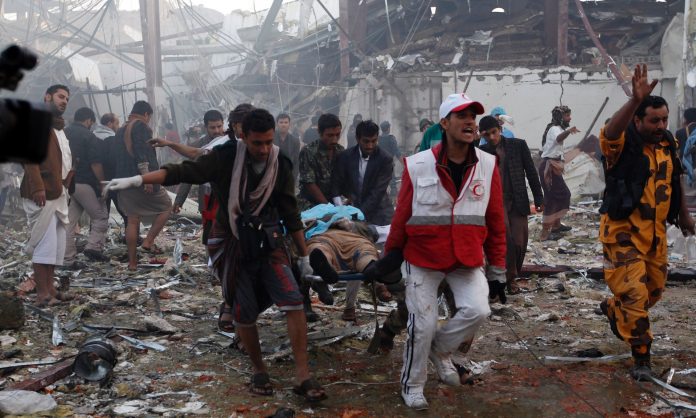By Kate Gould and Leah Muskin-Pierret
The United Nation’s recent announcement of a 72 hour truce in Yemen is a step forward, but it is not enough. To stop the bloodshed for more than three days, Washington must fully commit to cutting off weapons transfers if Saudi Arabia refuses to end its war on civilians there.
The U.S. is literally fueling the Saudi-led bombardment of Yemen by continuing to refuel its jet planes. Washington is also furnishing bombs, including the bombs that Saudi jets dropped on a packed Yemeni funeral hall, killing 140 civilians and injuring over 500 more.
After this massacre, the Obama administration announced it would conduct a full review of U.S. military assistance for Saudi Arabia. While the review isn’t complete yet, anonymous administration officials have indicated that future military assistance will hinge partly on whether Riyadh adheres to the ceasefire call.
While welcome news, Saudi compliance with a temporary ceasefire is no reason to continue U.S. arms transfers. This ceasefire will only deescalate the violence in the long term if Washington follow through on its statement that “U.S. security cooperation with Saudi Arabia is not a blank check.” The administration must, at a minimum, be unequivocal in its commitment to halt U.S. military support to Saudi Arabia until Riyadh agrees to a peaceful political solution for Yemen.
Saudi Arabia’s attacks on Yemeni civilians are nothing new. Extraordinarily horrific as the attack on the funeral hall was, it was not unexpected in a war that has already claimed some 3,800 civilian lives, most lost in U.S.-backed Saudi airstrikes that have targeted schools, markets and even four Doctors Without Borders hospitals in a single year. As Sen. Chris Murphy, D-Conn., has explained, “there’s an American imprint on every civilian life lost in Yemen.”
Fortunately, some lawmakers are already heeding the call to challenge U.S. policy on autopilot in Yemen. Last month, 27 senators registered their dissent on U.S. policy on the Yemen crisis. They supported a measure introduced by Murphy and Sen. Rand Paul, R-Ky., to block an arms sale to Saudi Arabia and accordingly move the U.S. from complicity to decisive, constructive action. While the measure ultimately failed to block the arms deal, it sparked the first major congressional floor debate on the issue in more than a quarter century.
Yet members of Congress can, and must, do more. Lawmakers should support the ceasefire call and encourage the administration to end military support until Saudi Arabia, at a minimum, ends its war in Yemen. Members of Congress can also cosponsor bipartisan legislation in both the House and the Senate to restrict future bomb transfers to Saudi Arabia on the condition that the kingdom ends its indiscriminate attacks on civilians and facilitates humanitarian access. Signing onto this legislation sends a powerful message: Systematic assaults against civilians will no longer be tolerated and facilitated by the United States.
7.6 million Yemenis suffer from malnutrition and 3 million suffer displacement. U.N. human rights chief Zeid Ra’ad al-Hussein remarked on the release of the jarring numbers that “those responsible for the violations and abuses against them enjoy impunity.” And as Paul noted, this dire situation has direct consequences for the United States: “Anti-American sentiment is spiraling as the local population blames the U.S. for the thousands of civilian deaths resulting from the Saudis’ bombing campaign. This will come back to haunt us.”
Continually tearing at the fabric of Yemeni society – in the name of security – in fact renders Yemen, and everyone, less secure. The terror facing Yemeni civilians is also turning isolated, embattled corners of Yemen into safe havens for organized terrorism, which makes us all more vulnerable to violence.
Until our politicians act, U.S. complicity in the carnage will continue. Allowing Washington to arm Saudi Arabia’s assault on Yemen spells disaster for the humanitarian crisis there, as well as for the people of Saudi Arabia and the United States. Ultimately, the futures of Yemenis, Saudis and Americans are tied, whether in the festering mess of a destabilizing war, or the possible promise of a peaceful settlement.




















